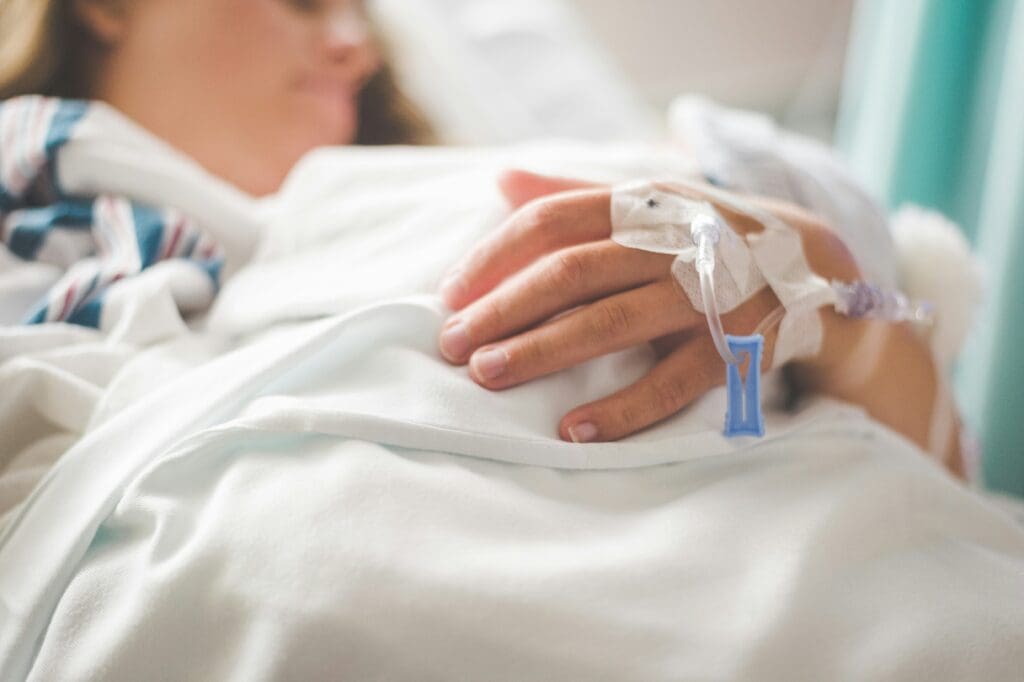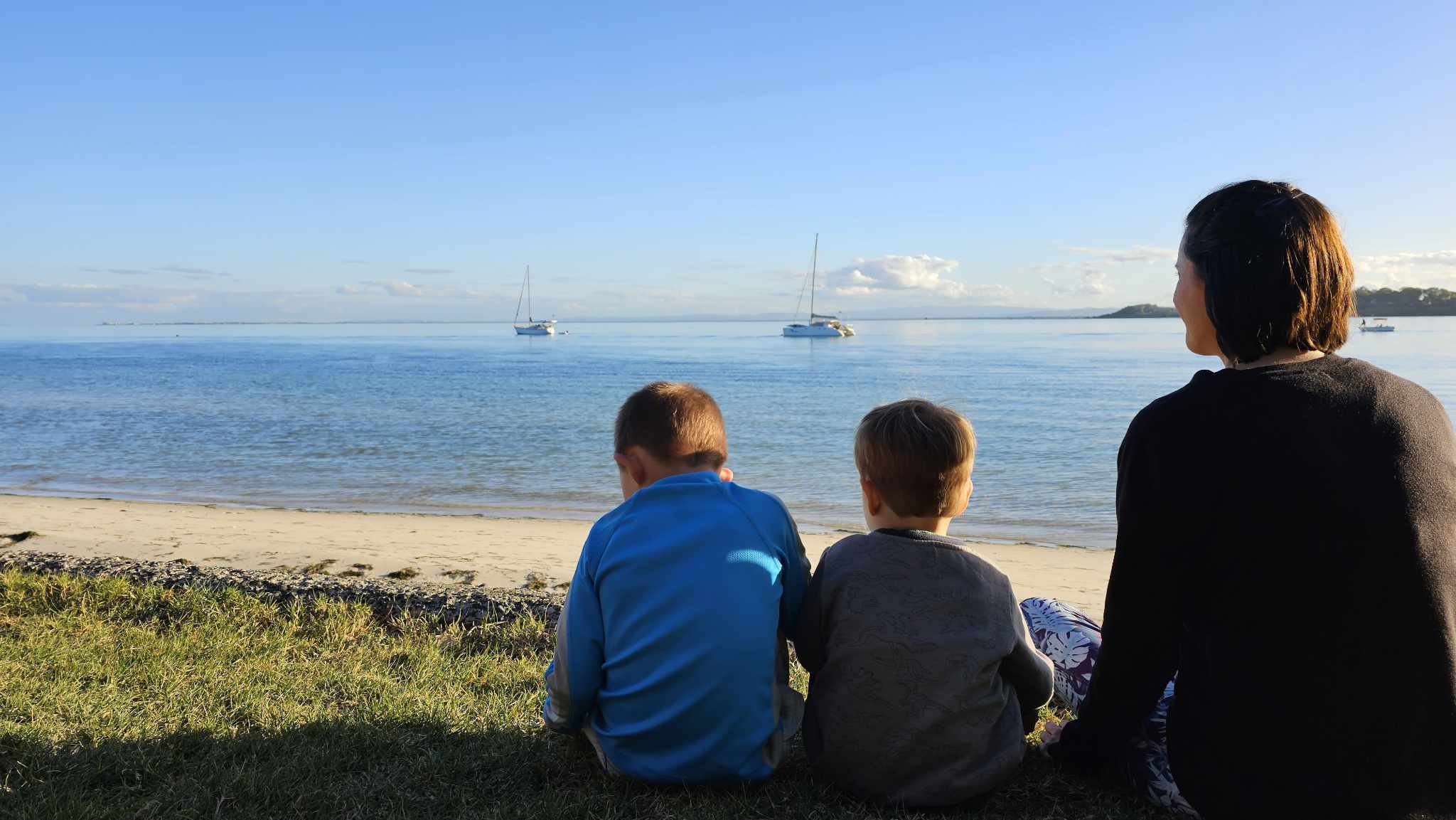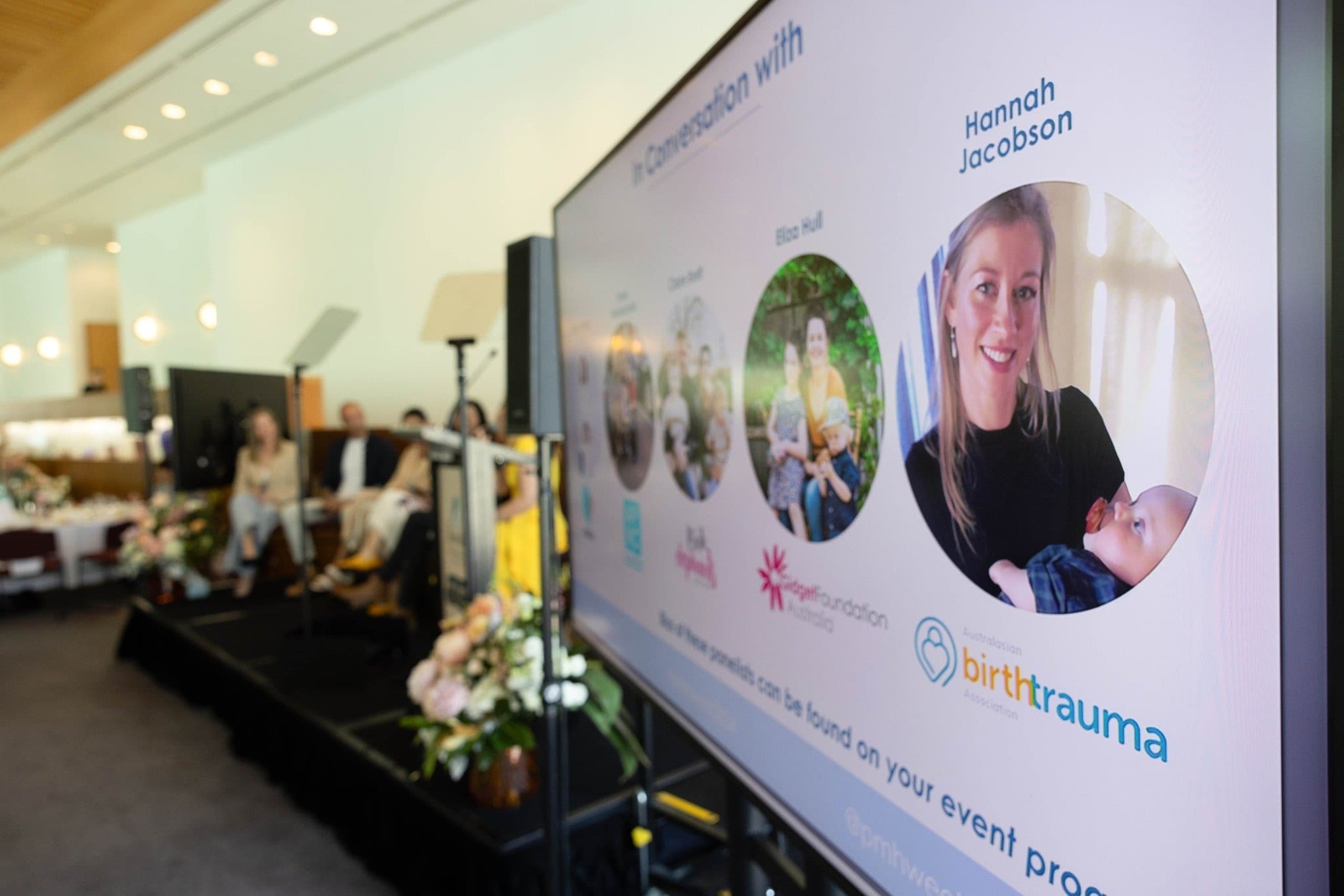First pregnancy
Motherhood was never part of my immediate plans. I was weeks away from embarking on a three-month placement in Ghana, Africa to work in a mental hospital as part of my psychology studies. Unexpectedly, I found out I was pregnant, and it felt like the worst thing that could have happened to me at that point in my life. The grief overwhelmed me, and then came hyperemesis gravidarum (HG). I was 6 weeks pregnant and all of a sudden experiencing constant nausea and vomiting that confined me to my bed, making even the simplest tasks like scrolling on my phone, showering, or driving, a mammoth effort. The word I used to describe my pregnancies is ‘poison’.
As someone who never stopped and led a full and busy life, this sudden halt was disorienting. Everyone around me seemed to wait for my sickness to pass, but no one truly understood the magnitude of what I was going through. Ignorant comments and advice about morning sickness only added to my frustration: “You are the sickest pregnant woman I know,” “At least you’ll be skinny!” I tried every remedy imaginable, but nothing provided relief. It felt like pregnancy had stripped away everything in my life, leaving me alone and broken. It was so difficult to eat or drink and I had to be so careful with food as I was highly averted and it would cause gagging and vomiting episodes. I couldn’t even walk into my kitchen as I was so put off by food. I had nose bleeds regularly, chronic heartburn, acid reflux, relentless nausea and I had barely put on any weight at all. I was confused as to why I couldn’t handle being pregnant while so many around me seemed to breeze through it.
I mustered the strength to return to work at about 16 weeks, but my condition made it challenging to function. I took a lot of time off as some weeks were worse than others and there was no way I could drive – let alone work – on those bad weeks. Even when I did work, I was vomiting in the car on the way there. I would have looked so sick when I was at work. I never felt good. I remember being called in for a three-day Melbourne trip (I was a flight attendant) and I begged them on the phone not to send me. I was pregnant, sick and I could barely walk through a grocery store, but, because my workplace told me morning sickness was not an excuse to take sick leave, I went. Somehow, I did survive, by vomiting down in the back galley and trying to eat pieces of bread to get through each shift.
Eventually, I had to take maternity leave early.
Throughout my pregnancy, no one diagnosed me with HG or offered any treatment or support. I felt very alone, I felt broken and would often say that pregnancy just didn’t agree with me. I stopped vomiting at 30 weeks. I went from vomiting 10+ times a day to just living with acid reflux and heartburn, which was a relief – but I still felt poisoned. For months I lived one day at a time. My pregnancy had taken a toll on me, both physically and emotionally.
First birth: Forceps delivery
Approaching my due date, I went into spontaneous labour at 39 weeks. I just wanted this baby out so that I felt better. But, because I was so unwell for so long, birth prep had gone completely out the window, and I just thought I should “go with the flow”. I had a long labour (24 hours). Some moments were nice. I felt bonded and connected to my husband who was a great support person. But after I had artificial rupture of membranes (AROM) the pain became so unbearable I ended up just screaming for hours on a bed until they administered an epidural. After pushing and baby becoming distressed, four doctors walked in giving me the option between forceps or vacuum. I had never heard of these instruments before, so I asked them what they would do. The use of forceps during the vaginal delivery was incredibly traumatic. I still remember the doctors shoving the forceps into me, rotating them and then pulling my baby out – at this point, I was in and out of consciousness.
I tore severely, resulting in a 3B tear, and I was rushed to the operating theatre to repair it as I was losing a significant amount of blood. I held my baby for about two minutes before I was wheeled away. The entire ordeal was jarring and traumatic. I remember shaking so violently on the bed afterwards, feeling traumatized, legs in stirrups with my broken vagina on display for all to see. While the doctors were repairing my tear, all I could hear was a bunch of staff talk about concerts, holidays and their weekend plans. I remember thinking, “How is everything normal for these people, don’t they know what’s happened to me?” It was inconceivable that life was as it was. Everything had changed. I was in theatre for two hours. Eventually I fell asleep.
The reality of my birth injury and the potential long-term consequences shook me to the core. I questioned why nobody had prepared me for this, why nobody had warned me about the risks, and why nobody talked about prolapse or pelvic floor rehabilitation – this was a first. I needed help to get out of bed to pick up my baby or change a nappy, I had to be helped to the shower. It was humiliating. I had a women’s health physio come to see me in hospital and because I didn’t really understand what the hell just happened to me, I listened intensely to every word she said. She got me to try squeezing my pelvic floor – I felt nothing. Not a thing! It terrified me. What had happened to me!? I was high-risk for fecal incontinence and prolapse. That was hard to get my head around. Why had I never heard of this before? Was this really birth? I soiled myself in the hospital bed because I didn’t make it to the toilet in time. Was this my life now? I definitely felt traumatised and when I was wheeled back to my husband and baby I said to him, “Women do this every day, all the time, for centuries and I don’t understand?!”
Postpartum
I often looked at my wound, it was really shocking to see the state of my body and my vagina. I was terrified to go out of the house even to the local shop because of the urgency I felt when needing to go to the toilet. I imagined soiling myself in public, how embarrassing, I couldn’t risk that.
The postpartum period was really challenging. Beside the physical pain and recovery, I was often alone, isolated, and overwhelmed with taking care of a newborn and learning how to be a mother. I developed postnatal anxiety, specifically related to baby sleep, which consumed my thoughts and brought feelings of panic and dread. I hated it! I dreaded night time, I dreaded the crying at nap times, I felt so heightened all the time. Everything had changed, not just my physical body but my mind, my life. It took some getting used to and I was chatting to a maternal and child health nurse one day, whom I loved, and she mentioned that I may be experiencing postnatal anxiety – and it all just clicked! This wasn’t motherhood, this was anxiety. And being able to label the feelings helped me immensely – but I didn’t seek further support.
Second HG pregnancy
After finding my footing in motherhood and feeling a sense of stability, I discovered that I was pregnant again when my firstborn was only 7 months old. I remember thinking, I can do this, just as long as I don’t get sick. However, my optimism quickly faded as HG came on with a vengeance. The HG symptoms were relentless, and I was now weeing myself each time I vomited – which was a lot. I vividly recall memories of vomiting into anything within reach while my baby cried helplessly between my legs.
Feeling like my body was failing, I decided to seek help. I went to the hospital when I reached a point where I genuinely believed I was dying. I’d gone without food or water for several days and was still vomiting. The crazy thing is, I thought the hospital would send me home, but, to my surprise, they admitted me and finally acknowledged that I had HG, offering some relief through medication and IV fluids. It was the first time someone had acknowledged my struggle and provided a diagnosis. The treatment provided temporary respite, but the underlying resentment towards this pregnancy persisted. When I got home from the hospital, I lay in bed that night vividly planning an abortion. I knew what doctor to see, I knew I could lie and say I miscarried and I wasn’t going to tell a soul, not even my husband. That was the reality of my pregnancies: they were poison and I felt like every day was a fight to survive.
I never rubbed my belly because I wanted to feel my baby. When my babies kicked, I felt angry. I opened up to my husband a lot about my dark thoughts. He was so understanding. He is actually quite traumatised from my pregnancies and the thought of having another baby sends him into panic and dread.
Second birth
As my second birth approached, I had a gynecologist recommend an elective cesarean section due to my previous birth injury and the risks associated with tearing again. I was terrified of having a C-section, but equally terrified of tearing again. I considered alternative options to reduce the risk, but despite the planning, my labour was hard and fast, leaving no time for the intended interventions. In under three hours, I gave birth to my baby upon arriving to the birth suite during the first Covid-19 lockdown.
Immediately after birth, I expressed concern about feeling intense pain, it felt like my vagina was on fire. A doctor came in and was so rough, poking and prodding needles into me, flapping my broken vagina around, confirming I had another 3B tear and I needed surgery to repair. I burst into tears, it was like déjà vu.
Fortunately, my recovery after the second birth was less burdened by the forceps trauma, allowing me to regain some physical functionality earlier than before. However, my pelvic floor suffered, and I had to put in significant effort to restore its normal function.
In this postpartum period, I faced various challenges, including feeding difficulties with my newborn. From oral refusal to on-and-off feeding, my daughter’s struggle with eating heightened the postnatal anxiety that I never really dealt with. The pressure of returning to online studies added to the strain, and I found myself completely overwhelmed, experiencing episodes of rage directed toward my husband. I felt constantly wired and tense. I couldn’t sleep. I didn’t feel I had bonded with my baby like I did the first time, and I often found myself angrily reflecting on my pregnancy and birth experiences. Everything triggered me… mess, university, kids crying, kids waking up in the night, traffic, even when my husband would leave and go to work. I would scream and shake and go speeding in the car on my own, thinking about hurting myself so that someone would take how I was feeling seriously. I felt so out of control, confused, and overwhelmed with emotion 90% of the time. I could feel the tension in my body, my back ached and I felt wired constantly. I felt like my body was in overdrive all the time.
Healing
My second baby was three months old when I really paid attention to my feelings. It was after a few angry episodes with my husband who I felt intense resentment towards. After one night of arguing in bed – our new normal – I had a violent intrusive thought about him and I realised that I was not okay, and I needed to do something about it. Covid made that incredibly difficult though. So, I called a perinatal mental health helpline and spoke to someone who gave me some clarity. It was like I had changed directions after that phone call. I put all my energy into getting better. I connected with a psychiatrist who diagnosed me with moderate to severe postnatal anxiety and Premenstrual Dysphoric Disorder, but my pregnancy experiences never came up in these appointments. It wasn’t until I could finally go and see a perinatal psychologist that I discovered that a lot of what I was experiencing was Post Traumatic Stress Disorder (PTSD).
I was hesitant about taking medication due to the side effects, so I engaged in a holistic approach to my health and healing: hormone support, psychological support, nervous system support, nutrient repletion, and grounding and functional exercises. I started asking for help. I opened up about my struggles. I recognised that I needed to heal this body and mind that had been through so much stress and trauma – for the first time I acknowledged within myself that I had been through a lot. I found it incredibly helpful being surrounded by women who had similar experiences of struggle during pregnancy, birth, postpartum and beyond. Being amongst others and hearing their experiences has allowed me to practice deep empathy, and see outside of myself, which I attribute to my healing as I learnt so much from them and continue to do so.
Reflecting on my journey, I recognised the need for more support, intervention, and awareness surrounding HG, birth trauma and perinatal mental health. The lack of understanding and acknowledgement from others made it challenging to navigate these difficulties alone. I wish we were more open about the struggles that happen behind closed doors. To a lot of people, I seemed capable and competent, but reality was, I was struggling.
Throughout all of this, I discovered an extraordinary resilience that has led me on a path of post-traumatic growth. It has been five years since that first pregnancy, and I choose to recognise the leaps and bounds I have made in health and healing. I refused to let these struggles consume me. In that small glimmer of hope I had, it ignited a spark of determination to conquer the darkness. The transformation has been gradual, costly and time consuming, and met with many setbacks, yet has been profound. The journey towards post-traumatic growth was filled with triggers, flashbacks, and moments of despair, but, armed with a support system that I created and a newfound understanding of my own resilience, I persisted. I was able to confront my mental health challenges head-on, through therapy, understanding my conditions, self-reflection, and a deep exploration of my own expectations and societal conditioning. I acknowledged my strengths, embraced vulnerability and rewrote my own narrative. Throughout this experience, I realised that my own story had the power to inspire and advocate for change. I wanted to be a voice, and raise other women’s voices in breaking the silence and stigma around perinatal mental health and raise awareness. I used the opportunity during my psychology honours year to explore perceptions of birth trauma and storytelling because there is power in sharing our stories. My experiences have shaped me into a fierce advocate, a compassionate listener and, I hope, a beacon of hope for those navigating the complexities of motherhood and mental health. I found purpose beyond my own healing – to help others find theirs.
If you’d like to chat to someone about your birth experience and start getting support today, please reach out to one of our friendly Peer2Peer Support Team.




